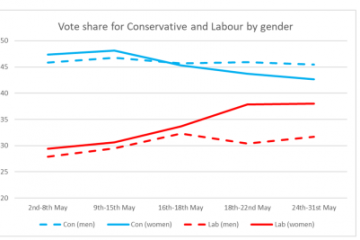
OxPol Blogcast. Women In Politics – In Conversation with Patricia Owens: Recovering Women’s International Thought From the Shadow of History
OxPol Blogcast showcases research, analysis, insights, and experiences from the members of the University of Oxford’s Department of Politics and International Relations (DPIR), and specialist guests from the Oxford academic community and beyond. Why were the contributions of some thinkers in the field of International Relations erased from history, while others became prominent enough to reach the reading lists of today? Many of those thinkers, whose perspectives never got to see the light of day, happen to be women. On this episode of the OxPol Blogcast, host Anastasia Bektimirova is joined by Dr. Patricia Owens, a Professor of International Relations at the Department of Politics and International Relations at the University of Oxford, who is recovering the thinkers lost in the 20th century by writing a gendered history …

OxPol Blogcast. Women In Politics – In Conversation with Mary Ann Sieghart: Is There a Gendered Authority Gap?
OxPol Blogcast showcases research, analysis, insights, and experiences from the members of the University of Oxford’s Department of Politics and International Relations (DPIR), and specialist guests from the Oxford academic community and beyond. Are women taken less seriously than men in politics? What causes the authority gap, and how is it manifested? On this episode of the OxPol Blogcast, host Anastasia Bektimirova welcomes Mary Ann Sieghart, the author of the best-selling book The Authority Gap: Why Women Are Still Taken Less Seriously Than Men, and What We Can Do About It. Having spent three decades covering British politics as a journalist, Mary Ann draws on her observations and interviews with fifty of the world’s most powerful, successful and authoritative women to discuss the experiences and causes of the …

OxPol Blogcast. Women in Politics – In Conversation with Rachel Bernhard: Can Gender-Typical Appearance and Behaviour Help Candidates Win Office?
OxPol Blogcast showcases research, analysis, insights, and experiences from the members of the University of Oxford’s Department of Politics and International Relations (DPIR), and specialist guests from the Oxford academic community and beyond. Are masculine behaviour and appearance among the prerequisites for electoral success, in line with popular belief? On this episode, OxPol Blogcast host Anastasia Bektimirova is joined by Dr. Rachel Bernhard, an Associate Professor at the University of Oxford’s Department of Politics and International Relations (DPIR), to put the view of the political arena as a place favouring conventionally masculine traits to a test. Focusing on the United States, Rachel explains what is understood as masculinity and femininity in political leadership, and guides us through the observed variation in voters’ response to those cues. We also discuss …

OxPol Blogcast. Women in Politics – Formal and Informal Politics of Women’s Representation and Activism in Latin America
OxPol Blogcast showcases research, analysis, insights, and experiences from the members of the University of Oxford’s Department of Politics and International Relations (DPIR), and specialist guests from the Oxford academic community and beyond. On this episode, we are focusing on the state of women’s descriptive and symbolic representation in party and civil society politics across Latin American countries. OxPol Blogcast host Anastasia Bektimirova welcomes three guests to bring you the stories of women’s agency at different levels of political participation in the region. The guests are sharing their expert view on the social environment, political culture, policies as well as written and unwritten rules that are shaping women’s progress and experiences in pursuing elected office, and engaging politically from civil society. With Dr. Malu Gatto, an Associate …

OxPol Blogcast. Women in Politics – Violence Against Women in Political and Public Life
OxPol Blogcast showcases research, analysis, insights, and experiences from the members of the University of Oxford’s Department of Politics and International Relations (DPIR), and specialist guests from the Oxford academic community and beyond. On this episode, we discuss how gender-based violence, one of the most devastating human rights issues of our time, manifests itself in political and public life. OxPol Blogcast host Anastasia Bektimirova welcomes four guests to unpack the issue of violence against women, the many forms it can take, how the experiences vary between serving politicians and candidates, men and women, and the activities, initiatives and mechanisms that are in place to combat it and help those who have become victims. With Reem Alsalem, the United Nations Special Rapporteur on violence against women, its causes and …

OxPol Blogcast. Women in Politics – In Conversation with Marta Antonetti: Role Model Effect, Political Representation, and Intersectional Methods
OxPol Blogcast showcases research, analysis, insights, and experiences from the members of the University of Oxford’s Department of Politics and International Relations (DPIR), and specialist guests from the Oxford academic community and beyond. On this episode of the OxPol Blogcast, host Anastasia Bektimirova is joined by Marta Antonetti, a DPhil Politics researcher at the University of Oxford’s Department of Politics and International Relations (DPIR). Marta guides us through her research on the effect of having diverse role models in politics on widening political participation among the underrepresented groups. We also discuss what it means to take an intersectional approach in social science research, and why it is important. Find out more about Marta’s research at https://www.politics.ox.ac.uk/person/marta-antonetti This episode is part of the series Women in Politics: Perspectives from …

If women ruled the world, would it be so different? From differentialism to a focus on ideology
A performance featured during the summer at the Manchester International Festival attempted to tackle the following timeless question: if women ruled the world, would they confront pressing social and political issues – such as climate change, military escalation and mass migration – in qualitatively different ways? The notion that the world would look different under female leadership assumes a “differentialist” approach to gender issues. This article, on the one hand, questions the underlying assumptions of that widespread belief, and, on the other hand, sketches out an alternative approach to progressive change in general and, more specifically, for women. Why we should be sceptical about differentialism in debates on gender A first and still very common version of differentialism is the …

Labour Poll Surge Thanks To Not Just Younger, But Also Older Women
Coverage of recent polls has suggested that women are becoming more supportive of Labour and that this is driving the recent tightening of the election race. The figure below shows the average vote intention separately for men and women on average using data from a range of different pollsters (see methodological note below). At the beginning of May there was very little gender gap. The Conservative lead was much the same for men as for women. For polls conducted in the past week, on average the Conservatives still had a large, 14-point lead amongst men, but only a small, 4-point lead amongst women. Compared with the start of May, women are now 7 points more likely to vote Labour than …









